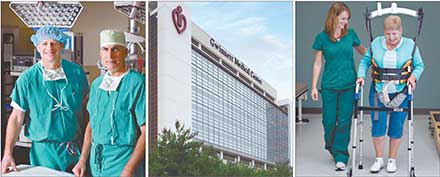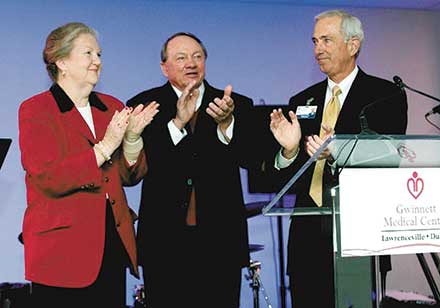
The award-winning GMC is not just one hospital but a not-for-profit network of licensed healthcare facilities and providers that are located in Lawrenceville and Duluth. The network includes two general hospitals, a free-standing hospital for women, a rehabilitation center and an extended care center. The huge Lawrenceville campus includes GMC – Lawrenceville, a hospital with 353 acute care beds that boasts two towers, The Gwinnett Women’s Pavilion, developed to address the evolving needs of women over their lifetime, and Gwinnett Extended Care Center, a nursing home facility with 89 long term care beds. The Duluth facility includes GMC-Duluth, a hospital with 81 acute care beds located on Pleasant Hill Road and Glancy Rehabilitation Center that has 30 acute care beds.
With the three facilities plus services in Snellville, Hamilton Mill and John’s Creek, GMC’s more than 4,500 employees, and a medical staff of more than 800 affiliated physicians, care for more than 400,000 inpatients, outpatients, emergency patients, and newborns every year. GMC provides practically every care imaginable – inpatient and outpatient healthcare services, including general acute care, emergency services, physical medicine and rehabilitation, skilled nursing services, and diagnostic and ambulatory surgical services. Specialized services include a Level II Trauma Center, a Level III NICU supporting newborn care, a Chest Pain Center, the Center for Neuroscience, minimally-invasive robotic surgery, and comprehensive sports medicine and orthopedic care services.
In addition, as a not-for-profit community hospital that is owned by the Gwinnett Hospital Authority, it serves everyone whether they are insured or not.
“Gwinnett Medical is like having Piedmont, Northside and Grady Hospitals all rolled into one,” said Wayne Sikes who chaired the Gwinnett Health System Board of Directors for 10 years and serves on the Gwinnett Hospital Authority. “GMC takes care of everybody.”
In other words, Gwinnett citizens seldom need to head to Atlanta for medical services and that includes cardiac and vascular care. In January 2012 GMC opened the 40,000-square-foot state-of-the-art Strickland Heart Center which features the most advanced operating rooms and cardiac catheterization laboratories in the Atlanta area. Hand-chosen expert cardiac and thoracic surgeons perform open heart surgery at the Center and treat nearly every heart condition known.
“We were already committed to building a cardiac center when Clyde and Sandra Strickland came forward and gave GMC $1 million,” Sikes explained. “That, and an additional donation from them for cardiac care, brought their total gift to $2.2 million for the center. Certainly this helped make it happen sooner.”
Striving to transform health care in Gwinnett has also resulted in a newly created Office of Research (OOR) which will support research for internal departments at the Duluth and Lawrenceville hospitals and for external physician groups using GMC facilities when conducting research.
GMC President and CEO Phil Wolfe says that in order to promote better health outcomes and make certain the community has increased opportunity for expanding health options, establishing the OOR was critical.
“The Office of Research will coordinate research efforts by providing excellent support and consultative services in areas including regulatory and financial aspects of conducting research as it relates to community physicians and staff,” Wolfe said.
On board and already making contacts is Holly Richards who is heading up the OOR. She comes to Gwinnett with more than 20 years of experience in clinical research operations and administration within the biopharmaceutical industry. With specialties in oncology and cardiovascular services, part of her job is to build relationships with biopharmaceutical companies that develop drugs, biologics and medical devices and contract with them.
“Patients in metro Atlanta are not always finding medical relief through normal channels,” explained Holly Richards, director of Office of Research. “The motivating factor in establishing this new office is to provide patients with access to investigational treatment options and give them the opportunity to remain in their community,” said Richards. “It can be difficult for patients undergoing treatment to travel far distances.”
“I am already having wonderful conversations with private sectors and government groups regarding research partnerships,” she said adding that the bulk of the funding is now coming from the private biopharmaceutical industry.
Gwinnett’s diverse population plays beautifully into the scenario of the OOR, according to Richards. “The Caucasian male is the most represented in clinical trials. But men, women and minorities have been shown to respond differently to pharmaceuticals,” she stated. “We are in the first stages of trying to understand those differences and the Food and Drug Administration (FDA) is working to increase participation of minorities in clinical trials,” she stated.
With clinical trials being the proving ground for new drugs, vaccines and devices, potential racial, ethnic and other differences in response to drugs are important in making sure that the safety and effectiveness of drugs are studied in all people who will use the products once they are approved.
“Gwinnett’s diverse population gives us the opportunity to offer biopharmaceutical companies what the FDA is looking for,” Richards said. “We are perfectly situated to gain more data that would be beneficial to not just Gwinnett but to overall healthcare (throughout) the country.”
Over the next five years Richards says the OOR will be building infrastructure and forming relationships to grow the research effort at GMC.
“I don’t have a crystal ball to know where we will be, but we will look a lot different in five years,” she promised. “There is amazing research already happening here and with the OOR, many physicians are coming into research or coming back,” Richards said.
One of those is Dr. Anthony Landis, medical director of Gwinnett Medical Center’s Center for Cancer Care (CCC). Along with his colleagues at Suburban Hematology-Oncology Associates (SHOA), Dr. Landis has been conducting oncology research in their practice for 10-12 years and has participated in many national trials. “We became investigators for drugs coming out of pharmaceutical companies and have run as many as 20 oncology trials at a time before scaling down for the merger with GMC,” Landis said.
Landis explained that SHOA has been participating in many cutting edge oncology trials through the UCLA Translational Research in Oncology program (TRIO) since 2003. GMC’s mission to bring exceptional research to community practices fits right in with what Landis and his partners want to bring to the Gwinnett community.
With the formation of the OOR, oncology research has become a joint effort and Landis and his team will now work with Richards and GMC research department staff rather than making partnerships with outside organizations on their own. “With so many trials having to be conducted through a hospital it made sense for our research department to be part of GMC.
“We want to get access to more pharmaceutical-driven trials because the more access you have the better it is for our patients especially due to the fact that they can be treated locally. And as we all know research leads to medical advances,” Landis concluded. “It’s going to be a great partnership.”
Another direction GMC is taking to better serve the community came as a result of the number of children and youth who play competitive sports in Gwinnett and a new Georgia law, the Return to Play Act of 2013. The new law requires schools and public recreation leagues to provide information to parents on the nature and risk of concussion and head injury and to establish concussion management and return to play policies. Being the first of its kind in the southeast and the third in the nation, the new Concussion Institute is truly cutting edge and is based on a model that practices a multifaceted approach to concussion injuries and sports rehabilitation.
“The Institute is all under one roof and is located in a recently renovated space of the Hudgens Professional Building located at GMC-Duluth,” Beth Okun, GMC spokesperson explains.. “It will officially open in August, when many of our school-aged athletes return to the field.”
With eight exam rooms, three therapy rooms, and access to two physical therapy centers in the area, the Institute will employ one of only two sports neuropsychologists in Georgia, Dr. Marla Shapiro. She will join six other employees, Director Tim Simmons, MHA, ATC, LAT, the manager Kristin Crea, a clinical education coordinator, an athletic trainer and a physical therapist. The Institute will also have access to a vestibular therapist and an occupational therapist.
In light of Georgia’s recently instated Return to Play Act of 2013, GMC believes its Concussion Institute will serve the state as the first of its kind to house concussion and sports rehabilitation under the same roof. GMC’s Institute will provide access to invaluable services and education for parents and athletes alike.
Next month we will look in depth at the impact the Concussion Institute will have on Gwinnett citizens and at the new Graduate Education Training Program and other aspects of how GMC is transforming health care in Gwinnett County.
For more information on GMC go to http://www.gwinnettmedicalcenter.org.
Also read Gwinnett Medical Center: History Continues….
Phil Wolfe, President and CEO of Gwinnett Medical Center, with Clyde and Sandra Strickland at the announcement of naming the hospital’s new Heart & Vascular Center, the Strickland Heart Center, in honor of their generosity. In total the Strickland’s have donated $3.2 million, the largest total gift in Gwinnett Medical Center Foundation’s history. (2011)


